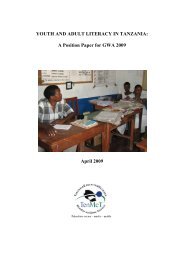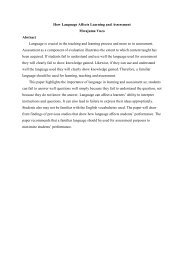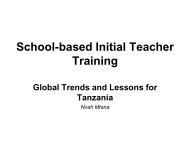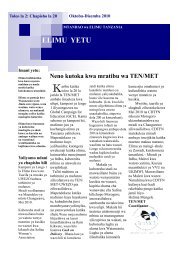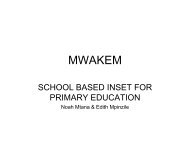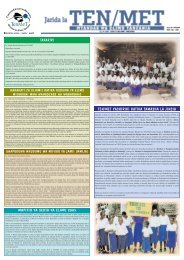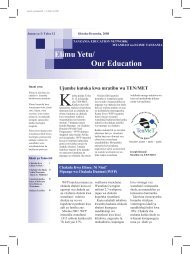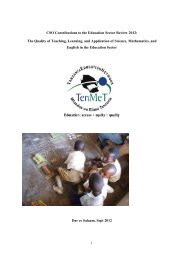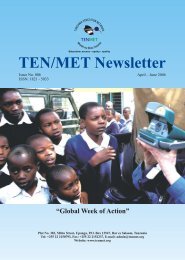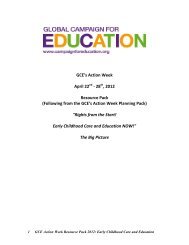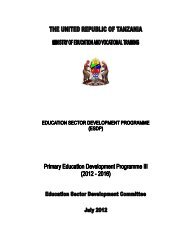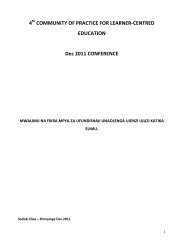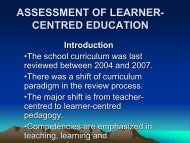Status of Children in Tanzania - 2012 - Tanzania Education Network ...
Status of Children in Tanzania - 2012 - Tanzania Education Network ...
Status of Children in Tanzania - 2012 - Tanzania Education Network ...
You also want an ePaper? Increase the reach of your titles
YUMPU automatically turns print PDFs into web optimized ePapers that Google loves.
Call for Action<br />
1.0 INTRODUCTION<br />
1.1 Description <strong>of</strong> the distribution <strong>of</strong> roles and responsibilities <strong>in</strong> the analysis<br />
team.<br />
Andrew S. T. Mchomvu<br />
Was the lead consultant who participated <strong>in</strong> shar<strong>in</strong>g the provided tool guide with SOS expert, customiz<strong>in</strong>g it to<br />
<strong>Tanzania</strong>n context, conducted meet<strong>in</strong>g with stakeholders at different levels, participate <strong>in</strong> desk review, field<br />
research at Kagera, Tanga, Kigoma, L<strong>in</strong>di, and Zanzibar, data clean<strong>in</strong>g, analys<strong>in</strong>g the data, writ<strong>in</strong>g report,<br />
visited stakeholders and f<strong>in</strong>aliz<strong>in</strong>g the report.<br />
Dr. Abu Mvungi<br />
Participated <strong>in</strong> desk review, conduct<strong>in</strong>g fieldwork research at Arusha, Kilimanjaro, and Dar es Salaam, also led<br />
data clean<strong>in</strong>g process and matched the data with major theme <strong>of</strong> the study, led the process <strong>of</strong> analys<strong>in</strong>g the<br />
data, writ<strong>in</strong>g report, and pro<strong>of</strong> red the f<strong>in</strong>al report version.<br />
1.2 Overall analysis process and methodologies applied.<br />
The Child Rights situational analysis <strong>of</strong> <strong>Tanzania</strong> is a process that lasted for fifty days from April to May <strong>2012</strong>.<br />
A team consist<strong>in</strong>g <strong>of</strong> experts from the Institute <strong>of</strong> Social Work, and SOS staffs work<strong>in</strong>g <strong>in</strong> different SOS<br />
<strong>Children</strong>‟s villages <strong>in</strong> <strong>Tanzania</strong>, namely Dar es Salaam, Zanzibar, Arusha, and Mwanza, DSW Dar es Salaam<br />
and Zanzibar led the analysis. The analysis was carried out through a process that <strong>in</strong>volved extensive<br />
documentary reviews conducted at ISW, UNICEF, Save the <strong>Children</strong>, REPOA, M<strong>in</strong>istry <strong>of</strong> Community<br />
Development Gender and <strong>Children</strong>, M<strong>in</strong>istry <strong>of</strong> Vocational <strong>Education</strong>al Tra<strong>in</strong><strong>in</strong>g, M<strong>in</strong>istry <strong>of</strong> Health and Social<br />
Welfare, and M<strong>in</strong>istry <strong>of</strong> Home Affairs. The documentary reviews focused on identify<strong>in</strong>g similar experiences on<br />
the actual status <strong>of</strong> children without parental care and those at risk <strong>of</strong> los<strong>in</strong>g parental care. Further, identified<br />
the major child rights violated.<br />
The children right situational analysis used primary data <strong>in</strong>formation from the f<strong>in</strong>d<strong>in</strong>gs collected from 14<br />
regions <strong>of</strong> <strong>Tanzania</strong>. The purposive sampl<strong>in</strong>g was used to determ<strong>in</strong>e study respondents. The study used<br />
documentary evidence to determ<strong>in</strong>e status <strong>of</strong> child rights situation <strong>in</strong> <strong>Tanzania</strong>. The data collection framework<br />
used an adopted guide developed by SOS children‟s villages Dar es Salaam <strong>2012</strong>. The tool is known as child<br />
rights situation analysis <strong>of</strong> children at risk <strong>of</strong> los<strong>in</strong>g parental care and children who have lost parental care.<br />
Focus Group Discussion Guide was used by target<strong>in</strong>g specific category <strong>of</strong> stakeholders regard<strong>in</strong>g violation <strong>of</strong><br />
children‟s rights at different scenario. In operationalise the tool 46 meet<strong>in</strong>gs were conducted 24 <strong>in</strong>terviews at<br />
district level 23 Focus group discussion were conducted, and 21 consultative meet<strong>in</strong>gs with primary and<br />
secondary stakeholders.<br />
1.3 Involvement <strong>of</strong> children, young people and families <strong>in</strong> the CRSA process as<br />
primary stakeholders<br />
<strong>Tanzania</strong> Child right situational analysis process started with collection <strong>of</strong> <strong>in</strong>formation from target group, young<br />
people and families <strong>in</strong> <strong>Tanzania</strong>. Six (6) focus group discussion were conducted at Zanzibar to the targeted<br />
group <strong>of</strong> children at (2) Maziz<strong>in</strong>i, (3) Makunduchi, (1) Kizimkazi, (1 Mal<strong>in</strong>di, and (2) SOS <strong>Children</strong>‟s Villages<br />
Zanzibar. In Ma<strong>in</strong>land 14 FGD were conducted, 1 from each district selected. Interviews with young people<br />
were conducted at children‟s homes and retentions centres these <strong>in</strong>cluded 21 <strong>in</strong>terviews with children at prison<br />
and 5 retentions homes located at Arusha, Tanga, Moshi, Upanga, and Mbeya. Additionally, <strong>in</strong>terviews to<br />
youth at 10 prisons namely Muleba, L<strong>in</strong>di, Tukuyu, Ir<strong>in</strong>ga, Morogoro, Wami, Keko, Segerea, S<strong>in</strong>gida, and<br />
Arusha. These prisons are popular for keep<strong>in</strong>g young children. Interviews to children with sampled police<br />
stations like Mbeya, L<strong>in</strong>di, Muleba, and Kigoma were conducted. Some purposively selected families were also<br />
<strong>in</strong>terviewed at SOS <strong>Children</strong>‟s Villages Zanzibar, Ir<strong>in</strong>ga, Mbeya, Mara, Same, L<strong>in</strong>di, Kagera, and S<strong>in</strong>gida. The<br />
study <strong>in</strong>terviewed randomly chosen young people and families to generate <strong>in</strong>formation that can give actual<br />
picture <strong>of</strong> <strong>Tanzania</strong>n children‟s rights status by target<strong>in</strong>g those who have lost parents or are at risk <strong>of</strong> los<strong>in</strong>g<br />
parental care.<br />
1.4 Description <strong>of</strong> stakeholders 2 <strong>in</strong>volved <strong>in</strong> the child right situational analysis<br />
process.<br />
Consultations with stakeholders was adm<strong>in</strong>istered at three levels, namely at National level, with stakeholders<br />
at m<strong>in</strong>isterial level where specific department deal<strong>in</strong>g with children were engaged. The second level was with<br />
NGOs, (FONGOS), In NGOs deal<strong>in</strong>g with targeted children. The third level was at district and community level,<br />
where primary target group <strong>of</strong> children resides. See table 1, which follows:<br />
1 / 55 <strong>Tanzania</strong>-CRSA-REPORT-<strong>2012</strong><br />
A lov<strong>in</strong>g home for every child




